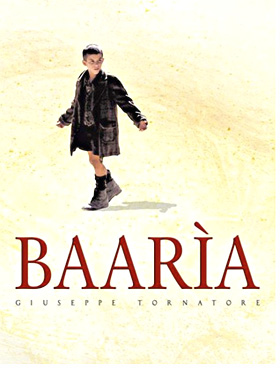...Best of Sicily presents... Best of Sicily Magazine. ... Dedicated to Sicilian art, culture, history, people, places and all things Sicilian. |
by Michele Parisi | ||
Magazine Index Best of Sicily Arts & Culture Fashion Food & Wine History & Society About Us Travel Faqs Contact Map of Sicily |
"Baarìa" is, of course, a local pronunciation of Bagheria, the director's home town, located just outside Palermo. In some ways the setting itself is problematical, for while Tornatore's other Sicilian films are set in more isolated locales, Bagheria can never be too remote from events. The production itself is exceptional. Ennio Morricone's musical score rounds out a flawless production. As if to evoke old photographs, the chroma of most of the film has been balanced to a yellowish cast. While effective, this can be tricky at times - almost a kind of artsy cinematic technique gone too far. That isn't the most annoying thing about this 150 minute film shot in Italy and Tunisia and subtly enhanced by computer generated imagery. The editing which unifies the various scenes is not a bad device, but Tornatore doesn't always provide much meat to go with the gravy, leaving us with some semi-developed story lines. The most disturbing was the incident at Portella della Ginestra in 1947, when eleven protesters were shot dead. We see the protest and the shootings but little of the aftermath. This may be okay for those familiar with the incident but it's an unsatisfying plot detail for almost everybody else. In another scene, a young boy loses a leg to a land mine (planted by the Germans during the Second World War) while running through a citrus orchard. What is annoying is not so much the lack of elaboration - we learn of the boy's fate in a later scene - as the complete absence of any commentary or implication about the effects of the war. The point here is that few outside Italy, or even Sicily, are familiar with the 1947 massacre, while most young people (even those with access to The History Channel) are less familiar than their elders with World War II. It might have been useful for Tornatore to include something to place these scenes in context. Several surreal scenes are magical in capturing the emotions. One of these, involving a fly, seems like an allusion to the cricket scene in Bertolucci's The Last Emperor. Another re-creates a part of the estate of the Prince of Palagonia which has since been supplanted by ugly buildings. Baaria is not precisely autobiographical. It is a story of many families of Sicily. While the movie is absolutely accurate in its depiction of political realities, the Mafia and the experiences of a great many Sicilians, the Sicilians as Victims angle, an undercurrent in many Tornatore films, wears thin after about an hour. It simply becomes tiresome. We may pity the young Mannina, forced into an arranged marriage by an illiterate father and rescued by the poor Peppino Torrenuova, the film's main character (masterfully portrayed by the talented Francesco Scianna), but the plight of the majority of citizens leads us to believe that in Bagheria - once a haunt of the wealthy famous for its aristocratic villas - there are no educated professional people. Granted that Barrìa isn't intended as a guide to Sicily's libraries, opera houses, universities, hospitals or aristocracy, its perspective does leave us with a slightly warped impression of the place and its people. In addition to the standard Italian audio version of the film, which includes bits of dialogue in Sicilian, another was released which is predominantly in Sicilian. This is of little importance to most viewers who speak neither language and rely on subtitles, but it is an interesting touch. Catania native Margareth Madè, who plays Mannina, is an exceptional young talent. The cast is mostly Sicilian, featuring the comic duo of Ficarra and Picone. There are cameo appearances by Monica Bellucci (star of Malena) and Raoul Bova. Baarìa is a contemplative film, perhaps even inspired in some ways, but despite its length and visual beauty it leaves us wanting. About the Author: Michele Parisi, who presently resides in Rome, has written for various magazines and newspapers in Italy, France and the United Kingdom. | |
Top of Page |
 Twenty years after his Academy Award-winning
masterpiece, Cinema Paradiso, master film maker
Twenty years after his Academy Award-winning
masterpiece, Cinema Paradiso, master film maker